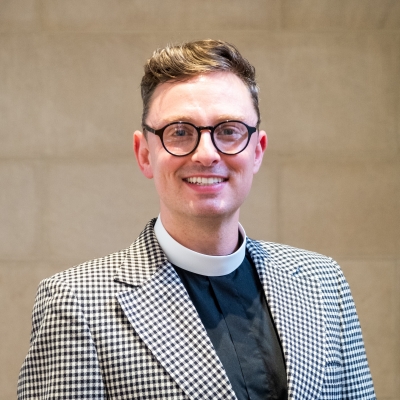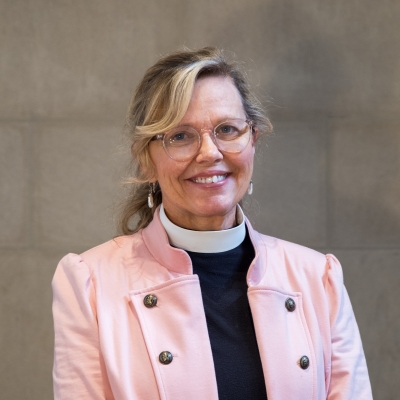Oct 13, 2024 |
Clinging & Letting Go
| The Rt. Rev. Jeffrey Lee
Clinging & Letting Go
The Rt. Rev. Jeffrey Lee preached at our celebration of the Holy Eucharist on the Twenty-first Sunday after Pentecost. Download the text of the sermon here.
Oct 06, 2024 |
Sunday Sermon
| The Rev. Rose Anne Lonsway
Sunday Sermon
The Rev. Rose Anne Lonsway preached at our celebration of the Holy Eucharist on the Twentieth Sunday after Pentecost. Download a copy of the sermon text here.
Sep 22, 2024 |
Sunday Sermon
| The Rev. Gabriel Lawrence
Sunday Sermon
The Rev. Gabriel Lawrence preached at our celebration of the Holy Eucharist on the Eighteenth Sunday after Pentecost. Download a copy of the sermon here.
Sep 15, 2024 |
Telling Truth
| The Rt. Rev. Jeffrey Lee
Telling Truth
The Rt. Rev. Jeffrey Lee preached at our celebration of the Holy Eucharist on the Seventeenth Sunday after Pentecost. Download the text of his sermon here.
Sep 08, 2024 |
Sunday Sermon
| The Rev. Patricia Rose
Sunday Sermon
The Rev. Patricia Rose preached at our celebration of the Holy Eucharist on the Sixteenth Sunday after Pentecost. Download the text of the sermon here.
Sep 01, 2024 |
Sunday Sermon
| The Rev. Gabriel Lawrence
Sunday Sermon
The Rev. Gabriel Lawrence preached at our celebration of the Holy Eucharist on the Fifteenth Sunday after Pentecost. Download the text of the sermon here.
Aug 25, 2024 |
Sunday Sermon
| The Rev. Rose Anne Lonsway
Sunday Sermon
The Rev. Rose Anne Lonsway preached at our celebration of the Holy Eucharist on the Fourteenth Sunday after Pentecost. Download the text of her sermon here.
Aug 18, 2024 |
Sunday Sermon
| Karen Carter
Sunday Sermon
St. Paul's parishioner, Karen Carter, preached at our celebration of the Holy Eucharist on the Thirteenth Sunday after Pentecost. Download the text of her sermon here.
Aug 11, 2024 |
Sunday Sermon
| The Rev. Gabriel Lawrence
Sunday Sermon
The Rev. Gabriel Lawrence preached at our celebration of the Holy Eucharist on the Twelfth Sunday after Pentecost. Download the sermon text here.
Aug 04, 2024 |
Sunday Sermon
| The Rev. Nathan Self
Sunday Sermon
The Rev. Nathan Self preached at our celebration of the Holy Eucharist on the Eleventh Sunday after Pentecost. Download the sermon text here.
Jul 28, 2024 |
Sunday Sermon
| The Rev. Rose Anne Lonsway
Sunday Sermon
The Rev. Rose Anne Lonsway preached at our celebration of the Holy Eucharist on the Tenth Sunday after Pentecost. Download the text of the sermon here.
Jul 21, 2024 |
Sunday Sermon
| The Rev. Gabriel Lawrence
Sunday Sermon
The Rev. Gabriel Lawrence preached at the celebration of Holy Eucharist on the Ninth Sunday after Pentecost. Download the sermon here.
Jul 14, 2024 |
Sunday Sermon
| The Rev. Patricia Rose
Sunday Sermon
The Rev. Patricia Rose preached at the celebration of Holy Baptism and the Holy Eucharist on the Eighth Sunday after Pentecost. Download a copy of her sermon here.
Jul 07, 2024 |
Sunday Sermon
| The Rev. Nathan Self
Sunday Sermon
Guest preacher, The Rev. Nathan Self, preached at the celebration of the Holy Eucharist on the Seventh Sunday after Pentecost.
Download the text of the sermon here. Jun 30, 2024 |
Sunday Sermon
| The Rev. Rose Anne Lonsway
Sunday Sermon
The Rev. Rose Anne Lonsway preached at the celebration of the Holy Eucharist on the Sixth Sunday after Pentecost. Download the sermon text here.
Jun 23, 2024 |
Sunday Sermon
| The Rev. Gabriel Lawrence
Sunday Sermon
The Rev. Gabriel Lawrence preached at our celebration of the Holy Eucharist on the Fifth Sunday after Pentecost. Download the sermon text here.
Jun 16, 2024 |
Sunday Sermon
| The Rev. Patricia Rose
Sunday Sermon
The Rev. Patricia Rose preached at the celebration of the Holy Eucharist on the Fourth Sunday after Pentecost. Download the text of the sermon here.
Rev. Patricia references these scenes in her sermon.


Rev. Patricia references these scenes in her sermon.


Jun 09, 2024 |
Sunday Sermon
|Sunday Sermon
The Rev. Jeanne Leinbach preached at our celebration of the Holy Eucharist and Holy Baptism on the Third Sunday after Pentecost. Download the sermon text here.
Jun 02, 2024 |
Sunday Sermon
| The Rev. Gabriel Lawrence
Sunday Sermon
The Rev. Gabriel Lawrence preached at the celebration of the Holy Eucharist on the Second Sunday after Pentecost.
Download the sermon text here.
Download the sermon text here.
